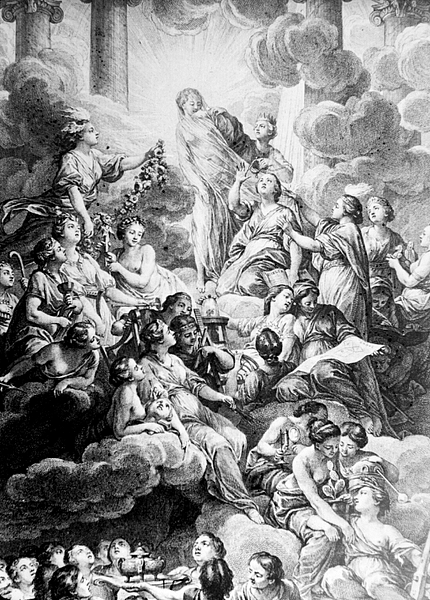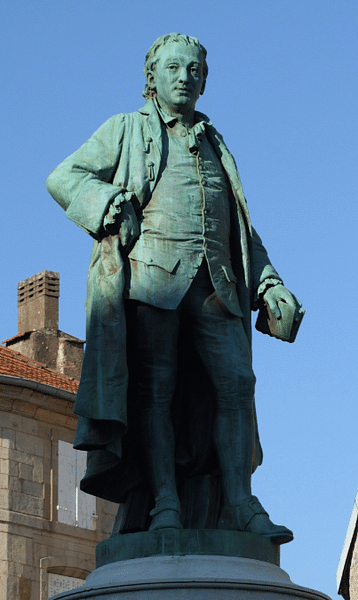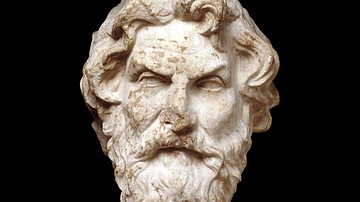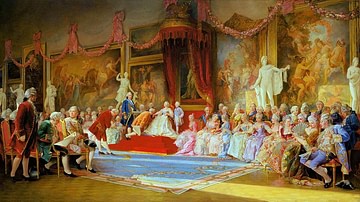
Denis Diderot (1713-1784) was a French author and philosopher known for his views which influenced the Enlightenment and his general editorship of the multi-volume Encyclopedia, often described as the 'Bible of the Enlightenment'. Diderot wrote his philosophical works using imaginative and witty literary techniques, which presented his secular and scientific view of age-old political and moral issues.
Early Life
Denis Diderot was born on 5 October 1713 in Langres in the north-east of France. Denis' father worked as a master cutler (a maker of cutlery). Denis studied at the local college, which was run by Jesuits and then he studied in Paris. Denis fell out with his father when he refused to pursue studies for a career either in the Church or to practise law. Another blow to the relationship, which Diderot depended on for money, was his decision to marry without his father's permission. Denis made a living in Paris as a private tutor and through translation work.
Character & Relationships
Diderot was known for his generosity to his literary friends in terms of the time he dedicated to their various projects. He was also known as a vibrant conversationalist and letter writer, skills which can be particularly seen in his surviving correspondence with his mistress "Sophie" Volland (real name Louise-Henriette, 1716-1784). Diderot and Sophie first met c. 1755, and they remained friends even after Diderot took another mistress from 1768. Diderot was married to Mademoiselle Champion with whom he had one daughter, Angélique.
Non-Philosophical Works
Diderot wrote a number of works which had nothing to do with philosophy, none of which was particularly successful. He published a racy novel in 1748, Les Bijoux indiscrets (The Indiscreet Jewels). His 1749 Lettre sur les aveugles (Letter on the Blind) contained what seemed to be references to the author's atheism and resulted in Diderot being imprisoned for a few months in the Château de Vincennes.
Diderot wrote several plays in the genre known as bourgeois drama, a sort of mix of classic comedy and tragedy but with a contemporary storyline and moral message thrown in. In the words of Isaiah Berlin, "Diderot compares social life to a great workshop factory" (21). Diderot wrote about what he thought the genre should showcase in Entretiens entre Dorval et moi, published in 1757, and Discours sur la poésie dramatique, published in 1758. Here, Diderot expounds the advantages of what we today would call the kitchen-sink drama for improving the morality of the audience. Another literary genre Diderot involved himself in was art criticism. From 1759, for example, he wrote reviews of the major art exhibition at the Louvre, held every two years.
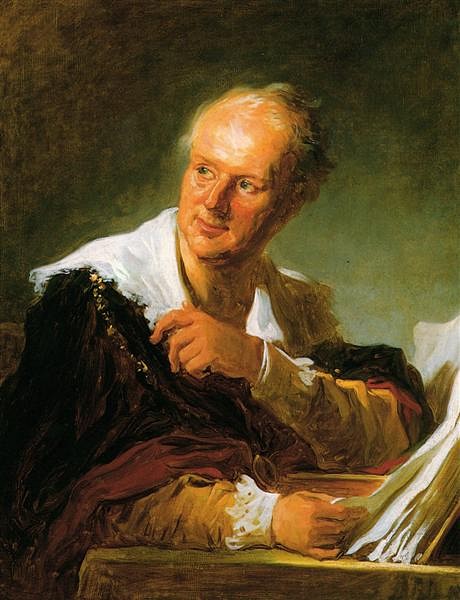
The Great Encyclopedia
Diderot, along with Jean-Baptiste le Rond d'Alembert (1717-1783), was the main editorial driving force behind the Encyclopedia, a monumental task of scholarship with the objective of creating a new compendium of knowledge, which presented provocative new ideas in philosophy, the arts, and science. Diderot took over the role of chief editor after the abbé Jean-Paul de Gua de Malves dropped out one year into the project.
The entries of the Encyclopedia were penned by a wide range of authors – around 140 in total – who included star writers like Montesquieu (1689-1757), Jean-Jacques Rousseau (1712-1778), and Voltaire (1694-1778). There were many less well-known contributors, and one quarter was provided by Chevalier Louis de Jaucourt (1704-1779), who often used what we today would call a "cut-and-paste" technique to reproduce large chunks of texts published elsewhere. Nevertheless, a significant proportion of the articles were written by specialists in the subject (e.g. scientists, surgeons, grammarians, artists, musicians, and economists), which was an innovation for encyclopedias, as was the indication of who had written each entry. Diderot's own articles on political philosophy included Political Authority, Natural Law, Representatives, and Sovereign. The writer-editor did much more than these, though; the historian R. Robertson suggests that Diderot may have contributed up to one-third of the articles.
Just the title took some working out, the official name being: Encyclopédie, ou Dictionnaire raisonné des sciences, des arts et des métiers (Encyclopedia, or Systmatic Dictionary of the Sciences, Arts, and Crafts). The idea was to create a reliable repository of up-to-date information, which people could use to then make further discoveries of knowledge. The knowledge in the Encyclopedia was meant to help the ongoing battle of the Enlightenment against outdated traditional views, misinformation, ignorance, and superstition. As the historian N. Hampson summarises, it was, in short, "an anthology of 'enlightened' opinions on politics, philosophy, and religion" (86).
The work began in 1747 and eventually produced 17 volumes of text and a complimentary 11 volumes of illustrations (some 2,500 engravings). The Encyclopedia was first published in 1751 but regularly added to in future editions. Extra volumes came along too – three volumes on biographies, with a fourth volume to illustrate them, and, in 1780, a now much-needed index in another two volumes. The work was massive – it eventually contained around 72,000 articles – but clearly highly desirable since some 25,000 sets were sold by 1800. The success was despite repression by the state and Church, who did not like the many articles calling for reform (although the publisher had been censoring the articles without Diderot's knowledge precisely to avoid such a consequence). The initial price of 280 livres or £14 (equivalent to £2,600 or $3,300 today) was very expensive, but this seems not to have harmed sales. Consequently, the Encyclopedia was "probably the most profitable publishing venture of the 18th century" (Chisick, 154). Napoleon Bonaparte (1769-1821) even took a set of the encyclopedia on his military campaign in Egypt.
Diderot's fame as a thinker worth listening to led to many invites to the salons of Paris through the 1770s. In 1773, he began a 5-month stay at the court of Catherine the Great (empress regent of Russia, 1762-1796). The pair engaged in armchair chats three times a week. Another ruler eager to hear Diderot's thoughts on statecraft was Frederick the Great in Prussia (l. 1712-1786).
Diderot's Philosophy
Diderot's reputation as an important philosopher in the Enlightenment rests on several works which were only published after his death. He wrote a critique of monastic life in La Religieuse (The Nun) in 1760, but it was only published 26 years later. Similarly, Jacques le Fataliste (Jacques the Fatalist) was written c. 1773 but not published until 1796. Two other works had to wait even longer: Le Neveu de Rameau (Rameau's Nephew), written c. 1663 and published in 1805, and Le Rêve de D’Alembert (D'Alembert's Dream), written in 1769 but first published in 1830. Diderot's imprisonment in Vincennes must surely have made him aware of the dangers of presenting radical views in print. In any case, Diderot was not interested in sales but hitting the right sort of reader. He once wrote to his publisher the following note:
I repeat, there are some readers whom I do not, and never shall desire. I write only for those with whom I should enjoy conversing. I address my works to the philosophers; so far as I am concerned, there is no one else in the world.
(Hampson, 161)
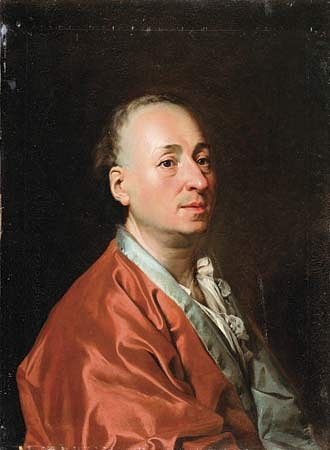
In Rameau's Nephew, a work he could not resist tinkering with over two decades, Diderot discusses the key ideas of the Enlightenment. The historian H. Chisick describes Rameau's Nephew as "perhaps the outstanding production of the Enlightenment" (348). The form of the book is a dialogue between the author and Jean-François Rameau, the nephew of the famed composer Jean-Philippe Rameau. Jean-François is presented as an amoral, egoistic bohemian while Diderot is a thoughtful philosopher. Crucially, Diderot is not presented as winning the arguments with Jean-François over the issues they debate, which range from politics to art to life in Paris. Diderot was not always in agreement with other enlightened thinkers, and here he questions certain ideas that gripped contemporary philosophers such as that people are motivated by self-interest and the usefulness to society of art and science. Diderot famously wrote a critique of the materialist philosopher Claude Adrien Helvétius (1715-1771) in 1773, which was not published in his own lifetime.
Diderot's philosophy emphasised the need for governments to consider overall utility in everything they do. He seems in later life to have drifted away from his earlier faith in an absolute monarch and instead favoured a system of a sovereign ruler limited by a consultative assembly whose membership was based on property ownership. Diderot was more optimistic than thinkers like Thomas Hobbes (1588-1679) regarding human nature. Someone who Diderot did greatly admire, if only for his very wide range of intellectual endeavours, was the philosopher and polymath Gottfried Wilhelm Leibniz (1646-1716). Diderot once stated, "When one compares one's own talents with those of Leibniz it is tempting to throw away one's books and go off to die in some quiet corner" (Gottlieb, 163). Certainly, Diderot knew that human knowledge was far from complete, and perhaps, to think that it is would be the greatest folly. Diderot noted in the introduction to the Encyclopedia that one of its aims, besides presenting the causes, effects, and reason of things, was "to teach men to doubt and wait" (Gottlieb, 239). Diderot seems to have adopted this approach himself, and it makes clearly identifying what he believed in problematic.
Diderot was himself, then, racked with doubts, often shifting between the two extremes of determinism and materialism, for example. He was far from sure who was responsible for and controlling the world in which we live: "Oh God, I do not know if you exist" (Hampson, 95). His thoughts may be summarised as a humanistic belief in individual autonomy and the positive use of modern, non-religious, and, if possible, scientific arguments and methods to challenge age-old knowledge which was based on faith and superstition alone.
Major Works by Diderot
The most important works by Denis Diderot include (with publication dates indicated in brackets):
- Philosophical Thoughts (1746)
- The Indiscreet Jewels (1748)
- Letter on the Blind (1749)
- The Encyclopedia - Editor (1751)
- Letter on the Deaf and Dumb (1751)
- Thoughts On the Interpretation of Nature (1753)
- The Nun (1796)
- Jacques the Fatalist (1796)
- Rameau's Nephew (1821)
- D'Alembert's Dream (1830)
Death & Legacy
Denis Diderot died in Paris on 31 July 1784. His position today, thanks to his prolific catalogue of work, is secure as one of the celebrated quartet of French-speaking philosophes along with Montesquieu, Voltaire, and Jean-Jacques Rousseau. Diderot's fortunes have, however, changed over the centuries, as here noted by Chisick:
Diderot was the least appreciated by the broad public of his time, but is among the most admired and most closely studied by students of the Enlightenment today. Warm, open, with a great capacity and perhaps need for friendship, Diderot is among the most personally attractive of the main figures of the Enlightenment. (147)
Apart from his literary skills, it is Diderot's indecision and changing views that perhaps appeal the most as the reader themselves wrestles with complex matters with even more complex solutions. Above all, Diderot's positive attitude to progress in knowledge remains universally appealing: "I love that philosophy which raises up humanity" (Hampson, 233).
